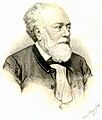Berthold Auerbach facts for kids
Berthold Auerbach (born February 28, 1812 – died February 8, 1882) was a German writer and poet. He was known for creating a type of novel called the "tendency novel." These stories used fiction to share ideas and influence people's thoughts on social, political, and moral topics.
Contents
Berthold Auerbach's Early Life
Berthold Auerbach was born as Moses (Moyses) Baruch Auerbach in Nordstetten, which is now part of Horb am Neckar, in Germany. He went to a school called Eberhard-Ludwigs-Gymnasium. At first, he was expected to become a minister. However, he studied philosophy at universities in Tübingen, Munich, and Heidelberg. During his studies, he became very interested in the ideas of a philosopher named Spinoza. This led him to focus on writing instead. While he was a student, he wrote a book about Frederick the Great (1834–1836) using the pen name "Theobald Chauber."
His First Books
One of his early books was called Das Judentum und die neueste Litteratur (Judaism and Recent Literature) in 1836. He planned to write many novels about Jewish history. From this series, he successfully published Spinoza (1837) and Dichter und Kaufmann ("Poet and Merchant"; 1839). The book about Spinoza was so accurate that it could be read as both a novel and a biography. In 1841, he also translated Spinoza's writings. In 1842, he wrote Der gebildete Bürger ("The Educated Citizen"). This book tried to make philosophical ideas easier for everyone to understand.
Becoming Famous
Auerbach became truly famous after 1843. This was when he started writing about the lives of everyday people. His best-known works focus on this topic. That year, he published Schwarzwälder Dorfgeschichten ("Black Forest Village Stories"; 1843). This book was a huge success and was translated into many languages. It shared his memories of growing up with a realistic and warm style.
In his later books, like Auf der Höhe (On the Heights; 1865), he showed how well he understood the people of southern Germany. He especially focused on the farmers in the Black Forest and the Bavarian Alps. His descriptions are known for being fresh, realistic, and humorous. His last books also showed a deep understanding of people's thoughts and feelings. Auf der Höhe was first published in Stuttgart in 1861 and has been translated into several languages.
Berthold Auerbach passed away in Cannes just before his 70th birthday.
Berthold Auerbach's Works
Here are some of the books Berthold Auerbach wrote:
- Schwarzwälder Dorfgeschichten (Tales of Villages in the Black Forest; 1843)
- Barfüssle (1856)
- Edelweiss (1861)
- Joseph im Schnee (Joseph in the Snow; 1861)
- Auf der Höhe (On the Heights; 1865)
- Das Landhaus am Rhein (A Country House on the Rhein; 1869)
- Waldfried (1874) – This book was inspired by Germany becoming a united country and the Franco-Prussian War.
- Nach dreissig Jahren (After Thirty Years; 1876)
- Der Forstmeister (The Forest Master; 1879)
- Brigitta (1880)
- Briefe an seinen Freund Jakob Auerbach (Letters to His Friend Jakob Auerbach; published after he died, 1884)
Images for kids
See also
 In Spanish: Berthold Auerbach para niños
In Spanish: Berthold Auerbach para niños



